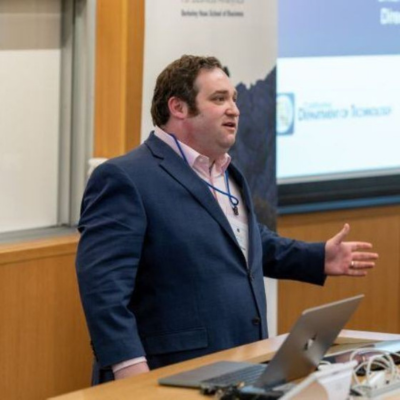
With Special Topics Course, the INI Brings Artificial Intelligence Ethics into Focus
By Evan Lybrand
Media InquiriesAs Artificial Intelligence (AI) becomes an ever-present part of modern life, the importance of integrating ethics and policy considerations into engineering curricula has grown. The College of Engineering at Carnegie Mellon University (CMU) responded to the growing demand for well-rounded AI engineers with a college-wide effort in 2022, launching seven graduate degree programs focused on different aspects of AI engineering, from mechanical to biomedical engineering and more. The Information Networking Institute (INI) participated in this effort, combining its deep expertise in information security with AI engineering to create the MS in Artificial Intelligence Engineering - Information Security (MSAIE-IS).
In addition to creating and contributing to new core courses, including INI Associate Teaching Professor David Varodayan’s 14-747: Introduction to Machine Learning with Adversaries in Mind, the INI has invested in developing electives that explore the intersections between AI and ethics. Last fall, Adjunct Professor Lake Dai brought together a diverse group of industry, policy, health and research experts to discuss the ethical implications of AI with students. The goal of this special topics course was to foster a healthy, interdisciplinary discourse about AI and its broader impact on society and people across the globe.
“Having in-depth conversations with industry leaders, policymakers, researchers and mindfulness experts, students gained clear insights into AI’s ethical complexities—from corporate governance to public policy—and learned to navigate them with both rigor and empathy,” said Dai. “Our students are the AI builders of tomorrow, so it’s critical they understand the impact of the tools before they learn to use them.”
Dai has years of experience working in industry with companies like Alibaba and Yahoo. After two decades, she brought her expertise to the startup field by becoming a Venture Capitalist. Currently, Dai teaches AI courses at the Integrated Innovation Institute (III) at CMU. 14-691: Special Topics: AI Ethics - Multidisciplinary Perspectives and Industry Insights is the first course she has taught for the INI.
Explore the guest speakers and their talks below.
Week 1: Andreea Bodnari, Founder of ALIGNMT AI
 Bodnari is the founder and CEO of ALIGNMT AI, a risk-monitoring AI that helps streamline healthcare reporting. She provided a historical perspective on artificial intelligence, focusing on the shift from deterministic systems to probabilistic AI.
Bodnari is the founder and CEO of ALIGNMT AI, a risk-monitoring AI that helps streamline healthcare reporting. She provided a historical perspective on artificial intelligence, focusing on the shift from deterministic systems to probabilistic AI.
Key Points:
- Understanding Deterministic vs. Probabilistic AI: Deterministic AI offers reliability through predefined logic, while probabilistic AI is valued for its capacity for autonomous, flexible decision-making.
- Generating AI Alignment: The concept focuses on creating trustworthy AI systems through fairness, transparency and accountability.
- Considering Human Agency in AI: It is important to maintain human oversight, particularly in scenarios where AI impacts human lives.
- Implementing Healthcare Standards: Bodnari called for clear regulatory standards and user involvement in designing healthcare-focused AI.
Week 2: Jonathan Porat, Chief Technical Officer of the State of California
 As the California State Chief Technology Officer (CTO), Porat shared insights into California’s nuanced approach to AI governance, aimed at both leveraging AI benefits and safeguarding public interests.
As the California State Chief Technology Officer (CTO), Porat shared insights into California’s nuanced approach to AI governance, aimed at both leveraging AI benefits and safeguarding public interests.
Key Points:
- Protecting the Workforce: California mandates upskilling rather than replacing workers with AI solutions.
- Balancing Regulation with Outcomes: California carefully weighs AI’s potential benefits and risks before making policy decisions.
- Engaging the Community: California actively involves tech companies, academic institutions and community organizations in AI policy development.
- Innovating Procurement: The state’s challenge-based procurement process invites diverse players, such as startups, to work on state AI projects.
Week 3: Charles Courtenay, 19th Earl of Devon
 Courtenay is an English hereditary peer and barrister who is a member of the House of Lords. He gave a thought-provoking examination of AI’s impact on law and ethics, discussing the critical balance between encouraging AI-driven innovation and addressing the ethical and regulatory challenges it presents.
Courtenay is an English hereditary peer and barrister who is a member of the House of Lords. He gave a thought-provoking examination of AI’s impact on law and ethics, discussing the critical balance between encouraging AI-driven innovation and addressing the ethical and regulatory challenges it presents.
Key Points:
- Balancing Innovation and Regulation: Courtenay advocated for responsible innovation that respects Intellectual Property (IP) rights and ethical considerations.
- Addressing Global Disparities: There is a potential for AI to deepen economic inequalities and there needs to be fair, inclusive AI development.
- Adapting the Legal System: Common law can address AI-related legal challenges as they arise.
- Cooperating Across Borders: Courtenay highlighted that AI’s global nature requires international regulatory collaboration.
Week 4: Dr. Barry Kerzin, Physician to the Dalai Lama and Adjunct Professor
 Dr. Kerzin is an Adjunct Professor at the University of Pittsburgh School of Medicine, an Honorary Professor at the University of Hong Kong and the founder and President of the Altruism in Medicine Institute. He offered a unique blend of medical, ethical and philosophical perspectives on AI, focusing on the essential role of compassion in both healthcare and AI systems.
Dr. Kerzin is an Adjunct Professor at the University of Pittsburgh School of Medicine, an Honorary Professor at the University of Hong Kong and the founder and President of the Altruism in Medicine Institute. He offered a unique blend of medical, ethical and philosophical perspectives on AI, focusing on the essential role of compassion in both healthcare and AI systems.
Key Points:
- Centering the Science of Compassion: Studies show compassion’s positive neurological effects, especially in long-term meditators.
- Integrating AI in Healthcare: AI systems should enhance healthcare outcomes. However, human empathy should remain irreplaceable.
- Tracking Mindfulness with AI: AI could be used to track changes in meditators’ brains to advance mental health research.
- Training Developers in Compassion: Compassion science should be taught to AI developers to integrate human values into AI design.
Week 5: David Reitter, Senior Staff Research Scientist at Google DeepMind
 Reitter is a Research Scientist at Google DeepMind who works on generative AI. Reitter delivered a comprehensive lecture on the current state and future directions of AI development, with a focus on ethical considerations and technological advancements.
Reitter is a Research Scientist at Google DeepMind who works on generative AI. Reitter delivered a comprehensive lecture on the current state and future directions of AI development, with a focus on ethical considerations and technological advancements.
Key Points
- Reinforcing Truthfulness in AI: Challenges in defining and implementing truthfulness include programming AI to admit lack of knowledge.
- Considering Ethics: Reitter said ethical researchers should be included in AI development to guide matters of ethics and bias.
- Improving AI Safety: It is complex to incorporate user feedback while preventing manipulation.
- Investing in Essential Skills: Critical thinking, computational thinking, adaptability and communication are essential skills for the AI age.
- Improving Transparency and Trust: It is important that AI systems communicate their limitations to users.
Week 6: Rob Chesnut, Former General Counsel and Chief Ethics Officer at Airbnb
 Chesnut is the former General Counsel and Chief Ethics Officer at Airbnb and the Author of “Intentional Integrity: How Smart Companies Can Lead An Ethical Revolution.” He emphasized the importance of cultivating integrity within organizations.
Chesnut is the former General Counsel and Chief Ethics Officer at Airbnb and the Author of “Intentional Integrity: How Smart Companies Can Lead An Ethical Revolution.” He emphasized the importance of cultivating integrity within organizations.
Key Points
- Instilling Organizational Integrity: Integrity spreads from leadership downwards and it is the role of leaders to set ethical standards. Engaging integrity programs result in higher employee engagement compared to traditional compliance.
- Preventing Misconduct: Misaligned goals can lead employees to unethical practices which encourages dishonest behavior.
- Creating Integrity-Driven Policies: Airbnb implemented policies on alcohol and romantic relationships to create a safe, respectful workplace environment.
- Focusing on Long-Term Stakeholders: Success lies in prioritizing stakeholders and sustainable practices over short-term profits, creating a more integrity-focused organization.
